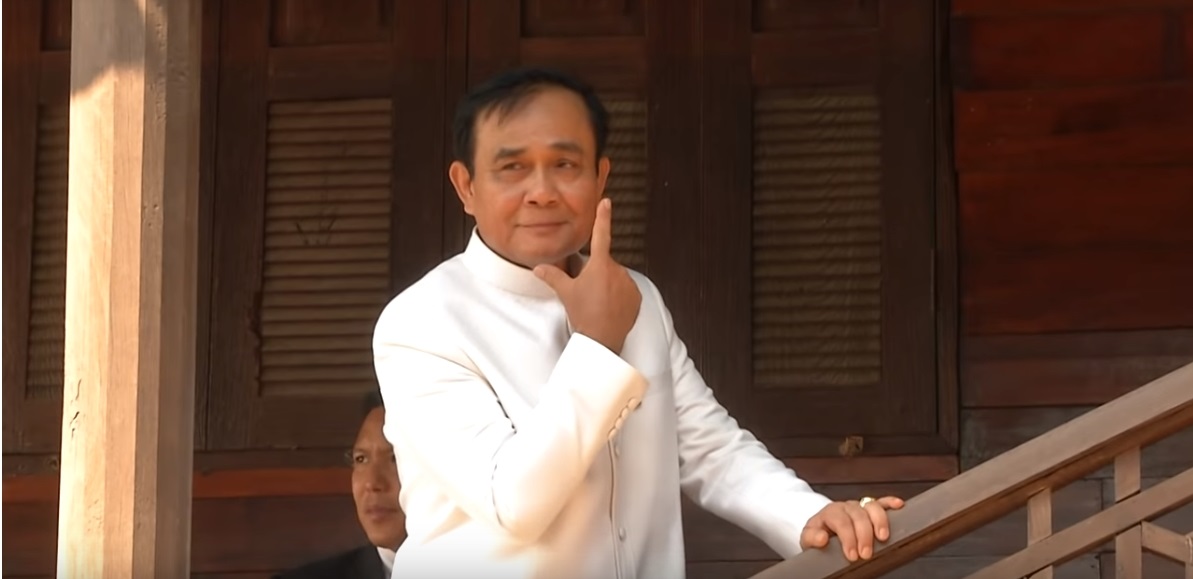Prime Minister Gen Prayut Chan-o-cha has claimed that HM the King asked for no prosecutions under Article 112 of the Criminal Code. However, other laws and extra-legal means have been used to stop anti-monarchy speech.

Gen Prayuth Chan-o-cha
On 15 June, the Prime Minister stated that the things that he is most concerned about now are acts denigrating the monarchy.
He urged Thai people not to believe distorted messages that create hate which are being spread increasingly as a special day approaches. The Prime Minister did not identify the day but observers believe he was referring to the anniversary of the 1932 Siamese Revolution on 24 June.
On anti-monarchy campaigns in neighbouring countries and Europe, the Prime Minister said that the authorities will send letters to these countries and it would depend on how they reacted. Gen Prayuth denied that Thailand was operating undercover missions outside the country.
The Prime Minister added that the authorities have asked for the cooperation of states where there are anti-monarchy movements. Some of the people involved have refugee status. Those people must know what they should not do in those countries.
“Be aware why Article 112 is not being used to prosecute cases and why there are people grabbing this opportunity. His Majesty has royal mercy and his royal grace has been directly repeated to me these past 2-3 years not to use Article 112.”
Deputy Prime Minister Gen Prawit Wongsuwan said that the authorities are now investigating the anti-monarchy network. When the names are identified, they will be prosecuted. He also affirmed that Article 112 will not be used.
Computer crime, sedition and ‘extra-legal means’ replace lèse majesté
Article 112 imposes jail terms of 3 to 15 years for each count on those who defame, insult, or threaten the King, the Queen, the Heir to the throne, or the Regent.
Prachatai reported in 2019 that no new Article 112 cases were prosecuted. However, Article 116 of the Criminal Code on sedition and Article 14 of the Computer Crime Act, which can be interpreted as criminalizing expression as a threat to the national security, are being increasingly used.
Extra-legal means are also used by the police and military officers. These include detention without a warrant, forcible collection of personal data, MOUs restricting future behaviour or forcing the signature of documents whose content is hidden. These methods are used against suspects without prior notification of their rights. Some people are forced to delete allegedly criminal posts.
Pavinee Chumsri, from Thai Lawyers for Human Rights (TLHR), said that the law does not permit officers to summon people without charge. Arrest and search warrants are also needed. Documents that are signed without the suspect knowing what they say are sometimes used in future prosecutions.
On November 2019, TLHR reported that a university student in Pathum Thani Province was taken to a police station by 3 plainclothes police officers who did not show her any official authorization. They only informed her that it was because of her twitter posts that were seen as defaming the monarchy.
The student, along with a university secretary, was taken to Khlong Luang Police Station where she was interrogated by about 10 unidentified plainclothes police officers. The main questions focused on her tweets about the monarchy, and her opinion of the Prayut administration.
The officers asked her to delete all of the allegedly criminal tweets. They also made copies of her mobile phone IP address, twitter ID, telephone number, all emails in her inbox, LINE chats, and Instagram and Facebook messages. She was pressured into signing her name to an MOU that allowed the authorities to inspect her electronic devices and use the collected data, which affirmed that the officers did not threaten or assault her and where she promised not to tweet any more messages about the monarchy.
In September 2018, Nathee, a 28 mentally ill man, was arrested over 2 Facebook posts from 2016 where he expressed his opinion about the late King Rama IX. He was charged by the police under the lèse majesté law and the Computer Crime Act. Later, the charge under the lèse majesté law was dropped and replaced by one under Article 116 of the Criminal Code on sedition.
In December 2019, Nathee was found guilty under the Computer Crime Act and sentenced to 3 years in prison, reduced to 2 years because the court found his testimony useful. While on bail pending an appeal, Nathee committed suicide on 12 April 2020.
In February 2020, Niranam_ (the name means ‘anonymous’ in Thai), a famous twitter user who posted many comments on the history of the Thai monarchy and become well-known among teenagers and social media users was taken to Pattaya Police Station without an arrest warrant.
He was subsequently charged with violating the Computer Crime Act over posting photos and messages about King Rama X. On 9 June, he faced 7 new charges related to 7 tweets about the current and former kings and claims about being a fashionista, the death of King Rama VIII, the October 1976 massacre and the 2006 coup d’état.
If found guilty on all 8 charges, Niranam_ faces a maximum of 40 years in prison (maximum 5 years for each charge).

Since 2007, Prachatai English has been covering underreported issues in Thailand, especially about democratization and human rights, despite the risk and pressure from the law and the authorities. However, with only 2 full-time reporters and increasing annual operating costs, keeping our work going is a challenge. Your support will ensure we stay a professional media source and be able to expand our team to meet the challenges and deliver timely and in-depth reporting.
• Simple steps to support Prachatai English
1. Bank transfer to account “โครงการหนังสือพิมพ์อินเทอร์เน็ต ประชาไท” or “Prachatai Online Newspaper” 091-0-21689-4, Krungthai Bank
2. Or, Transfer money via Paypal, to e-mail address: [email protected], please leave a comment on the transaction as “For Prachatai English”
